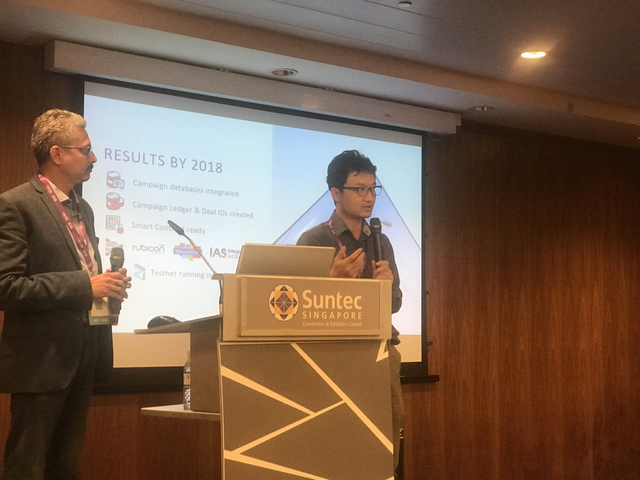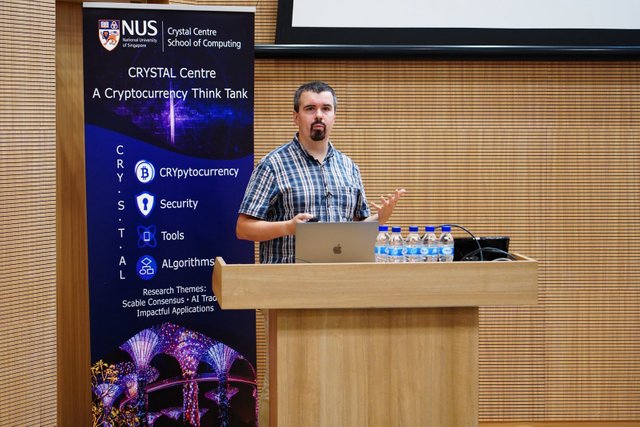Zilliqa Project Update #22 — Upcoming Testnet v3 and Public Mining
Our focus since November has been to double-down on development and ensuring that we deliver on our mainnet launch date of Jan 31, 2019. On our path towards that goal, we have been hard at work preparing for the release of our mainnet in January of 2019, starting with the release of Testnet v3 within the next week. Testnet v3 will enable public mining of testnet ZIL, allowing miners to begin testing their systems in preparation for our mainnet launch. We will share more details and documentation soon.
Project Proton
We shared the stage with our partner, Mindshare (one of the largest creative agencies in the world with over 7,000 employees and $34.5 billion in annual billing and a member of Group M), to talk about Project Proton at Singapore Digital Industry Day this week. We are committed to having the campaign databases integrated and the smart contract ready by the end of 2018.
 Xinshu presenting Project Proton with Gowthaman Ragothaman, COO of Asia Pacific at Mindshare.
Xinshu presenting Project Proton with Gowthaman Ragothaman, COO of Asia Pacific at Mindshare.
Ecosystem Grants
We recently announced a second wave of ecosystem grants that includes wallets, developer and user tools. For the third wave, we will be actively seeking applications for scalability (layer 2 solutions), gaming SDKs, Dapps, and Scilla additions.
Zilliqa AMA
We ran a detailed AMA on November 15 that fielded over 100 questions. We have consolidated the questions and answers here for future reference. Thank you to everyone who submitted questions and participated in our AMA!
As always, please feel free to connect in any of our social channels:
Telegram: https://t.me/zilliqachat
Slack: https://invite.zilliqa.com/
Twitter: https://twitter.com/zilliqa
Reddit: https://www.reddit.com/r/zilliqa/
Github: https://github.com/Zilliqa/zilliqa
Gitter: https://gitter.im/Zilliqa/ (Dev-related topics including the Ecosystem Grant)
Previous Events
CRYSTAL Center Scilla Workshop
We held an educational Scilla workshop at the CRYSTAL centre, a blockchain research and technology think-tank at the National University of Singapore. Ilya Sergey, our lead language designer, explained the design principles behind Scilla and went in-depth into how a System F language is beneficial for the smart contract space.

Ilya Sergey presenting Scilla at the CRYSTAL Centre at NUS.
Future of Blockchain
We’ve been ramping up our activities in London, and recently kicked-off the Future of Blockchain (FoB), a 3-month competition designed for those studying, researching or working at the universities of Oxford, Cambridge, Imperial, LSE, UCL and KCL. It starts in late November 2018 and ends with a finale at Oxford in late March 2019.
More details can be found here:
https://medium.com/future-of-blockchain/what-is-the-future-of-blockchain-competition-a9c08a76197a
Registrations are open until Dec 9:
https://www.futureofblockchain.co.uk/register/
Upcoming Events
7–9 Dec — Singapore
ETHSingapore
Tech Updates
On the technical front, we have frozen the feature-set that will go with the first version of the mainnet. The last remaining piece on the mechanism to decide on the (globally) acceptable gas price has now been implemented. With the freeze, we have now started the extensive testing of the system. Further details follow:
Gas Pricer
While our transactions are already processed with gas consumption and limits taken into consideration, the mechanism for determining actual gas pricing had yet to be implemented until recently. Our newly-coded gas pricer works by first, having miners affix to their proof-of-work (PoW) submissions a minimum gas price that they are willing to accept. The Directory Service (DS) committee then reaches consensus over the acceptable global minimum gas price for the network in the coming DS epoch. The network will thereafter only accept transactions that have a gas price larger than or equal to the agreed-upon global minimum.
Pre-Transmission of Gossip Hashes
One of the observed inefficiencies with our existing gossip protocol was that the entire message was being transmitted to all the node’s randomly assigned peers over each round, with nodes likely receiving the message multiple times and dropping the duplicates after the first reception. By pre-transmitting just the hash value of the message and requiring the receiving node to request for the actual message afterwards, we are able to significantly reduce the amount of data unnecessarily clogging the network.
Enhancements and Updates
Apart from the gossip hash pre-transmission, we continue to make improvements to the rest of our code base based on results from ongoing test efforts.
For instance, we observed during system testing that some nodes that failed to be included in any of the network shards would be stuck waiting for a DS Block that never arrives. Now we have introduced a timer-based sequence wherein the node attempts to rejoin the network (i.e., actively fetch the latest DS Blocks and reattempt mining at the next opportunity) if it has not received a block several minutes after making a submission.
Another recent improvement is the updating of our Ethash library to the latest release (version 0.3). We have been using the older version for the past several months now, and the move to the new version is necessary to address several known bugs and vulnerabilities. The new version also comes with a function interface that is easier to use.
Scilla Interpreter
During the last two weeks, we finished the first prototype for cashflow analysis as well as the one for static gas analysis. Recall that the goal of these analyzers is to aid developers in detecting bugs regarding money flow in a contract (cashflow analyzer) and statically estimating the cost of invoking a transition in a contract (gas analyzer). There are a few follow up tasks that we will undertake in the coming weeks:
Code cleanup, refactoring and documentation.
Supporting partial applications in gas analyzer and making the output message of the analyzer more readable.
Integration of analyzers in clients such as the Savant IDE.
We are very happy to share with you that we have successfully used the cashflow analyzer to detect some interesting bugs in Scilla contracts. We plan to write a dedicated blog post to explain these analyzers and their benefits in further detail.
Dev Tools and Testing
As we inch closer to the launch of the very first version of the Zilliqa mainnet, the core protocol has reached a feature freeze. Our developer tools follow a similar trajectory.
As a result, the past two weeks have involved high levels of internal testing of the JavaScript library both by some very dedicated community developers and team members (even non-technical members of the team!) Using this feedback loop, we have iterated on the existing APIs, making improvements to the developer experience and fixing bugs as we dogfood our own tool.
On a separate note, the JavaScript library has also seen heavy use in our newly-developed internal CLI, used to provide a more comprehensive and automated way of load testing the network at various scales. So far, we have tested non-Byzantine transactions of Category I and II, and will soon move on to Category III transactions, as well as Byzantine/malicious actions.
Lastly, as Scilla nears its final feature set for the main net launch, we also intend to give a final update to Savant IDE in the coming 4–6 weeks, so as to help developers hit the ground running when the wraps are finally taken off our work.
Zilliqa in the News
Interview with Xinshu on Decentralised Podcast: https://decentpod.io/2-3-xinshu-dong-zilliqa/
An article in Asian Scientist about Zilliqa Chief Scientific Officer Prateek Saxena: https://www.asianscientist.com/2018/11/features/sginnovate-blockchain-prateek-saxena/
Coverage (in Japanese) of our partnership with Layer X: https://jp.cointelegraph.com/news/layerx-zilliqa-nov13
An article about about our ecosystem building efforts: https://coindiligent.com/zilliqa-ecosystem